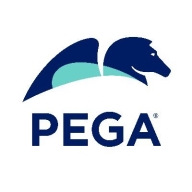

Pega Platform and Microsoft Power Apps compete in the enterprise application development space. Pega holds an advantage for large-scale implementations due to its comprehensive case management and BPM solutions, while Power Apps prevails in environments heavily invested in Microsoft services with its ease of use and data connectivity features.
Features: Pega Platform is renowned for its case management, offering fast prototyping capabilities and built-in integrations within its robust architecture. Power Apps, part of the Microsoft Power Platform, provides outstanding data connectivity options and rapid app creation with low-code tools, ideal for businesses deep into the Microsoft ecosystem.
Room for Improvement: Pega could improve its cloud capabilities and streamline the upgrade process, with complexity and costs remaining a deterrent for smaller companies. Power Apps may enhance usability for larger enterprise applications with better integration outside its ecosystem and more user-friendly documentation, including refining its licensing model.
Ease of Deployment and Customer Service: Pega supports diverse deployment options like on-premises and hybrid clouds, though customer service quality varies. Power Apps benefits from Microsoft's strong cloud infrastructure, offering seamless deployment within Microsoft environments, but faces some support responsiveness limitations.
Pricing and ROI: Pega offers extensive enterprise capabilities with a significant ROI for large deployments, though licensing costs can be high. Power Apps provides competitive pricing especially when bundled with other Microsoft services, offering cost-effective app development for Microsoft-centric businesses, despite potential hidden costs in premium features.
The connection between Power Apps and Power BI simplifies generating and presenting reports, alleviating the workload and enhancing productivity.
The aim is to create a cleaner interface to replace spreadsheets, thus standardizing processes and improving efficiency.
Their assistance was crucial as we developed the solutions.
Microsoft's technical support is around a seven to eight.
The technical support from Pega is very low, rating a one or two out of ten.
I never needed support from the platform standpoint, but if additional features are required, we have regular meetings with the product team for feedback.
Pega's technical support team is very helpful.
If it is flexible and includes premium connectors, scalability is easy.
I would rate the stability of Microsoft Power Apps as a nine out of ten.
This would assist business process users who lack coding knowledge.
These tools should be intuitive for business users who will need at least a week of training to use them effectively.
The integration of Microsoft's autonomous AI agents would be an excellent enhancement for Power Apps.
Pega introduced Constellation, which allows a user to build a more engaging visual experience.
My learning curve in robotics has been challenging.
For small to medium enterprises, it is affordable, especially with Microsoft Enterprise licensing.
For more elaborate work, an upgrade to an enterprise license, costing around $35 per license, is needed.
Pega is priced higher than open-source options like Flowable but is suitable for large-scale industries like banking and insurance.
The pricing is expensive, and this is an issue.
It integrates seamlessly with Power Automate for process automation and connects with email, SharePoint, Power BI, and MS Teams, facilitating everyday processes.
If we are using Outlook or Power BI for our reports, the integration is easier because it is within the Microsoft ecosystem.
The most valuable features for us are predominantly on the user interface front.
Pega Platform is excellent for enterprise-level solutions with integrations to entire systems, including case management, service orchestration, CRM, decision-making capabilities, digital process automation, and AI-driven functionalities.
Management capabilities such as dashboards.


Microsoft Power Apps is a rapid application development software and low-code development platform. The solution consists of a suite of apps, services, connectors, and a data platform. It provides an environment for building custom apps which is suitable for different businesses.
Microsoft Power Apps allows users to not only build applications, but also connect them to Microsoft's other sources, including the underlying data platform Microsoft Dataverse, as well as online and on-premise sources such as SharePoint, Dynamics 365, and Microsoft 365. The applications built using Microsoft Power Apps have a responsive design that makes them suitable for work in browsers and on mobile applications on different devices.
The no-code side of the product makes it suitable for complete beginners to app building, allowing them to easily create fully functional applications with many features. The solution also has a specialized platform for developers where specialists can access data and metadata, create custom connectors, integrate with external data, and apply business logic. The solution allows users to create three types of apps: canvas, model-driven, and portal. They are made using:
Microsoft Power Apps Features
The three different design tools of the solution, Power Apps Studio, App Designer, and Power Apps Portals Studio, come with various features which allow users to utilize the tools. Some of these features include:
Microsoft Power Apps Benefits
The product brings various benefits to organizations and individuals who utilize it. Some of the biggest advantages of Microsoft Power Apps include:
Reviews from Real Users
An IT Specialist (INFOSEC) at a government appreciates this tool because it is low-code, low learning curve, and reduces manpower.
Rafael T., a data engineer at NTT Security, likes Microsoft Power Apps, because it is great for making apps quickly, has helpful support, and integrates with Power BI.
Pega Platform facilitates business process management, case management, and workflow automation for industries like banking, insurance, and healthcare. It supports digital transformation and customer service enhancements with its low-code capabilities and seamless integrations.
Pega Platform enables users to create efficient systems for case management, financial operations, and digital transformations. It provides tools for client onboarding, quoting, claims processing, customer experience improvements, and content management. Pega's low-code approach allows for the automation of complex processes, making it suitable for enterprises looking for adaptability and rapid deployment. While it offers strong real-time analytics and decision automation, users acknowledge challenges in user interface, integration, and performance aspects. High costs and a learning curve need attention, and enhancements in AI features and cloud services are desired.
What are the key features of Pega Platform?In banking, Pega Platform automates loan processing, accelerates customer onboarding, and manages compliance. Insurance companies benefit from streamlined claims processing and policy management. Healthcare sectors use the platform for patient engagement and care coordination, enabling organizations to adapt quickly to changing industry requirements.
We monitor all Rapid Application Development Software reviews to prevent fraudulent reviews and keep review quality high. We do not post reviews by company employees or direct competitors. We validate each review for authenticity via cross-reference with LinkedIn, and personal follow-up with the reviewer when necessary.